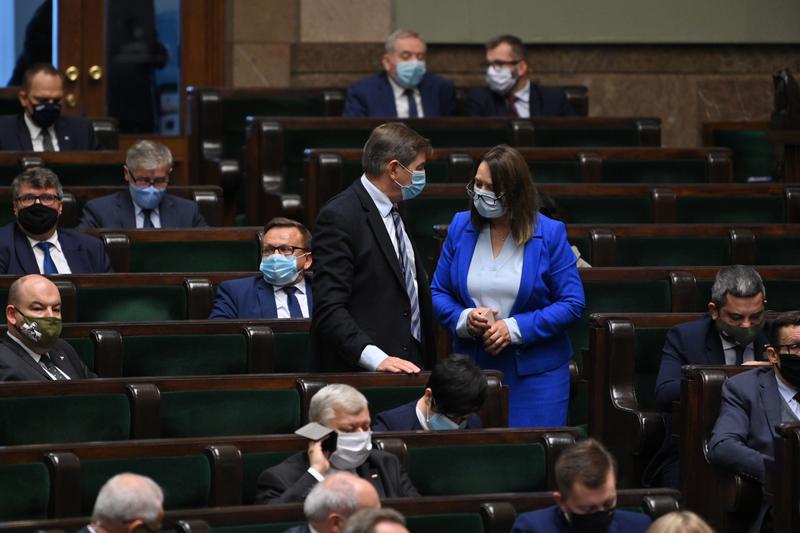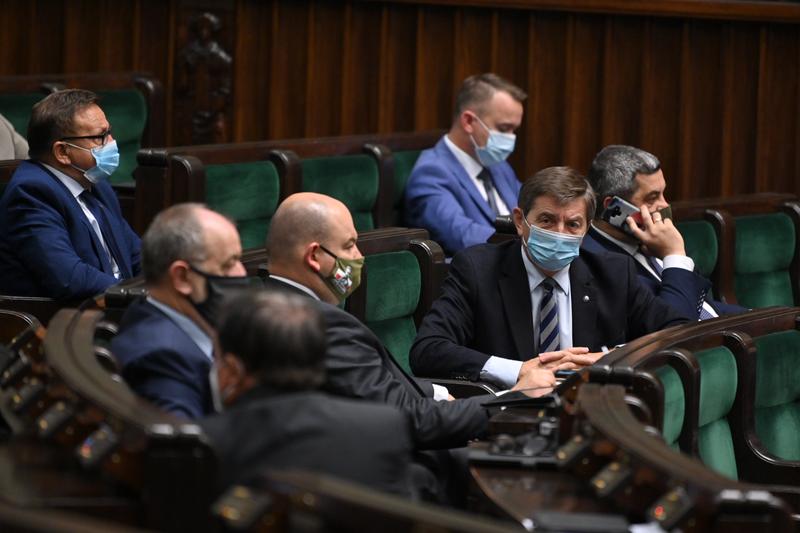Budgetary and taxation issues were the main items on the agenda of the 18th session of the Sejm held on Wednesday, October 7. The deputies also considered the Senate's positions on the Law on Medical Fund and the Law on Amendments to Certain Laws to Counteract the Socio-Economic Impact of COVID-19.
The first reading of the draft budget for 2021 and the so-called "related bill
The budget bill submitted by the Council of Ministers assumes that next year the state revenue will amount to 404.4 billion PLN and 486.7 billion PLN in expenses. The deficit is to amount to 82.3 billion PLN. Gross Domestic Product is expected to increase by 4%, inflation will not exceed 1.8%, the average annual salary fund will be 2.8% higher than this year's, and private consumption in nominal terms will increase by 6.3%. As emphasized by the government, the planned deficit is to provide funds to strengthen the economy weakened by the crisis caused by the COVID-19 pandemic. At the same time, all existing social programs will be maintained (including the Family 500+ and Good Start), as well as financing of Poland's defense needs at the level of 2.2% of GDP and increased spending in the area of higher education and science.
The draft law on special solutions for implementation of the Budget Law for 2021, presented together with the plan of expenditures and revenues of the state, envisages, among others, a limitation of expenditures in the public finance sector by maintaining the current year's basis for contributions to the company social benefits fund, social funds for social services, and social insurance funds for the elderly. The draft law on special solutions for implementation of the Budget Law of 2021 (the so-called "around-budget law") envisages, among others, limitation of expenditures in the public finance sector by remaining at the level of the current year bases for calculation of allowances for company social benefits fund, social funds for pensioners and disability pensioners of uniformed services and for teachers. Salaries in the public sector will also remain unchanged.
Other I readings
The Council of Ministers has presented two draft changes to the tax legislation.
The draft amendments to the Corporate Income Tax Act and certain other acts introduce the possibility for companies to settle up by means of the so-called Estonian CIT. Entrepreneurs who choose this method of taxation will be taxed only at the time of profit distribution. As a rule, Estonian CIT will be granted to companies whose shareholders are exclusively natural persons, whose annual revenues do not exceed PLN 100 million and who employ at least three employees under employment contracts (or incur salary expenses under other contracts in an amount at least three times the average monthly salary). In the case of new entrepreneurs and small taxpayers, the necessity of meeting these conditions will be spread over time. The entrepreneur will be able to choose to be taxed with Estonian CIT for four years, with the possibility of extension for further four-year periodsprovided that it still meets the above conditions. After the first reading, the Sejm sent the draft to the Public Finance Committee for consideration.
The draft amendments to the Personal Income Tax Acts, the Corporate Income Tax Act, the Act on Lump Sum Income Tax on Certain Income Earned by Natural Persons and certain other acts are aimed, among others, at sealing the tax system and increasing the number of taxpayers eligible for more attractive forms of taxation. The draft law also introduces a number of solutions attractive to taxpayers: the group of entities entitled to benefit from a reduced CIT rate of 9% will be increased The group of taxpayers eligible for lump-sum taxation will also increase (the annual revenue limit will be raised to EUR 2 million). The tax system is to be tightened by such solutions as tying the amount of tax paid by large enterprises - particularly international companies - to the actual place of income generation, introduction of a limit for the deduction of the so-called abolition relief to PLN 1360 as well as imposing CIT on limited partnerships. The Sejm decided to pass the bill to the Public Finance Committee.
Laws passed
MPs have amended the 2020 budget bill. The economic impact of the spread of the COVID-19 pandemic in Poland and around the world made it necessary to amend the macroeconomic assumptions enshrined in its original version passed at the beginning of the year. The second important objective of the amendment is to provide funds for further stimulation of the economy after the crisis caused by the pandemic. The most important modification made by the Sejm is the inclusion in the budget law of a deficit of PLN 109.3 billion. Budget revenue assumed for 2020 has been lowered by PLN 36.7bn to PLN 398.7bn, while expenditure will rise by PLN 72.7bn to PLN 508bn. Instead of the initially assumed GDP growth of 3.7%, it will fall by 4.6%.
Thanks to the provisions of the Act on Electronic Delivery communication of public offices with citizens and entrepreneurs as well as exchange of correspondence between the offices themselves will be simplified. The Act redefines the rules for correspondence between public entities and other public entities, between public entities and non-public entities, and between public entities and individuals. The default form of correspondence requiring proof of posting or receipt is to be a public registered electronic delivery service instead of a paper letter. People who are digitally excluded or otherwise not ready to receive official correspondence in digital form will continue to have the option to receive correspondence in traditional form.
Consideration of Senate positions
In a block of votes, members considered amendments proposed by the Senate to two bills.
The MPs agreed with the senators on some of the amendments to the Medical Fund Act. The most important amendment introduced by the Senate and adopted by the Sejm guarantees the FM an annual payment from the state budget in the amount not lower than 4 billion PLN.
The Sejm has adopted a number of amendments to the Act on amending certain acts to counteract the socio-economic effects of COVID-19. The adopted amendments are editorial and clarifying in nature. The act assumes, among others, maintaining increased VAT rates of 23 and 8% in 2021 and sets out the conditions for returning to rates of 22 and 7%.
Commemoration of Ignacy Lyskowski on the 200th Anniversary of His Birth
Deputies adopted a resolution to commemorate the 200th anniversary of the birth of Ignacy Lyskowski - a positivist, social activist from Pomerania, Polish member of the Prussian and German parliaments, defender of the Polish language against Germanization.
The deputies made changes in the personal composition of the parliamentary committees.




